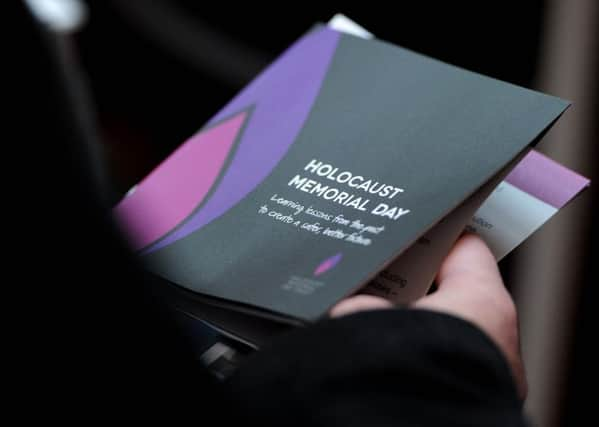Andrew Vine: Hatred of Jews rears its ugly head in post-truth age


When I first moved into the area 16 years ago, there never used be a security presence. But then, gradually, now and again guards would be posted, a sight so unusual that the residents on the opposite side of the road would talk to each other about it, and wonder what was wrong.
But now nobody comments on it because the guards are there all the time when services are held, sometimes joined by a police car and a couple of uniformed officers.
Advertisement
Hide AdAdvertisement
Hide AdEverybody has grown so used to seeing them that it has become routine. There isn’t anything to talk about any more.
But what we ought to be doing is talking more than ever about it, because of the threat the guards are there to deter.
A Jewish friend who served in the Parachute Regiment during the Second World War used to worry that Britain had taken its eye off the issue of anti-semitism that his generation knew for the obscenity it is.
People thought it belonged to the past, he said, when it was alive and kicking in the present. He died before the rise of the current far-right in Europe, but I know he would have despaired at it, not least because of the care its leaders take to look plausible and unthreatening.
Advertisement
Hide AdAdvertisement
Hide AdHe would have found something deeply sinister in the sight of carefully-groomed politicians with finely-calibrated public relations operations presenting themselves as patriots, whilst harbouring – but not acknowledging – the support of anti-semites.
It is perfectly possible that this will be the year when voter disenchantment with mainstream politicians will result in electoral success for the far-right.
The increasing threat posed by this movement, and the growing following it has online, was starkly illustrated by last week’s revelation that anti-semitic incidents of hatred and assault have risen to record levels in Britain.
The Community Security Trust recorded 1,309 such incidents in 2016 – a 36 per cent increase on the previous year, including 107 assaults, which is the highest tally since 2010.
Advertisement
Hide AdAdvertisement
Hide AdVerbal abuse, hate mail, graffiti and abusive posts on social media are included in the statistics, and though all the major political parties condemned anti-semitism, what is clear is that this particular cancer is growing in our society.
Part of it can be blamed on the increasing influence of the far-right in countries like France, the Netherlands and Germany, which is creeping into the consciousness of Britons filled with hatred.
But a more important reason is that we have entered what has been called the “post-truth” age, in which for many, assertion and opinion expressed on social media and given spurious legitimacy by being parroted on the internet carry more weight than cold, hard facts.
In this twilight world of conspiracy theories and downright lies, one of the nastiest manifestations has been the growth of Holocaust denial. A cursory internet search soon turns up a mass of revolting and shocking material denying the Nazi genocide of Europe’s Jews.
Advertisement
Hide AdAdvertisement
Hide AdRunning in parallel with it is a virulent anti-semitism that is being embraced by the hate-filled, the inadequate and the thick.
The internet’s capacity for acting as an echo-chamber for those with extreme views, who can always find somebody, somewhere who agrees with them, makes it the perfect breeding-ground for this malevolent filth.
In the same way that Islamist terrorists self-radicalise online, so anti-semites are stoking their hatred and prejudice. It is not a long step from being immersed in this material to sending a vile message over social media.
And from there, the next step towards shouting abuse in the street or even assaulting somebody, is frighteningly short.
Advertisement
Hide AdAdvertisement
Hide AdAs with countering any unwelcome material online, pushing back against this tide is extraordinarily difficult. But it has to be fought against.
Awareness of the lies about the Holocaust has currently been given a welcome boost with the release of the thought-provoking new film, Denial, which tells the true story of a court battle over the facts of the most infamous mass murder in history.
And the UK Holocaust Memorial Foundation project to record the testimonies of 100 survivors for a new education centre due to open in London later this year comes not a moment too soon as the number of eyewitnesses dwindles.
So too the visits by school parties to Auschwitz run by the Holocaust Education Trust are of immense value in ensuring the truth is known by younger generations who can help to counter the evil propaganda being spread online.
Advertisement
Hide AdAdvertisement
Hide AdIt should be a matter of national concern that the level of anti-semitic hate is on the increase.
Websites featuring the sexual abuse of children are regularly shut down and the men behind them tracked down. The time has come for a similarly zero-tolerance approach to anti-semitism.